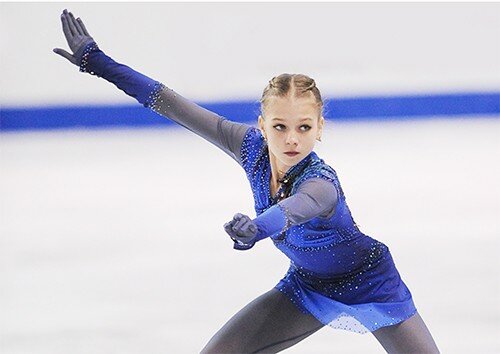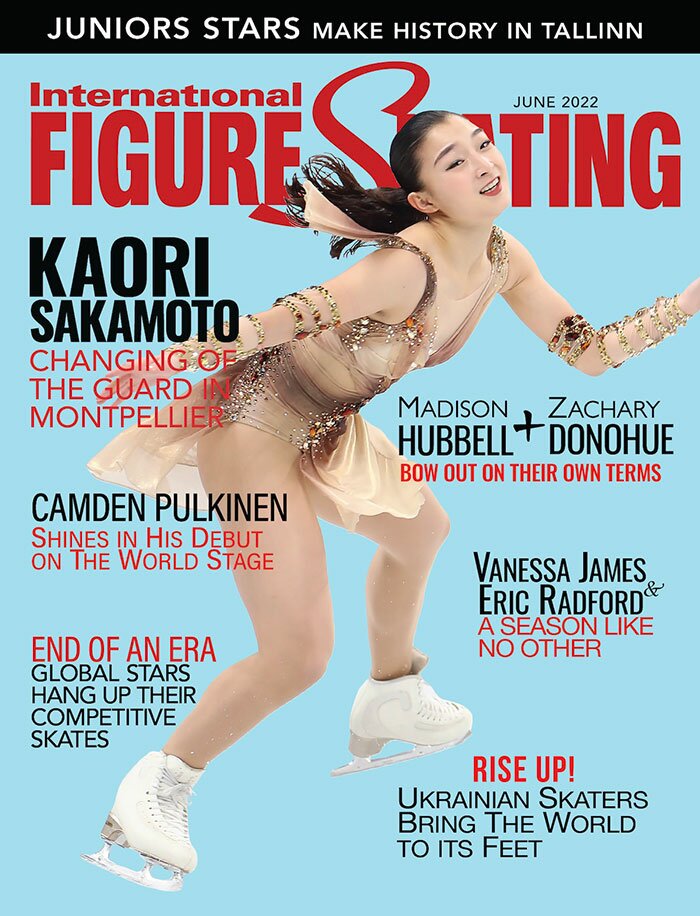

The Russian team captured all four titles in front of a full house of almost 14,000 skating fans on the second and final day of 2019 Rostelecom Cup.
The one competition the skating world was most interested in on Saturday was the ladies final, and the top three did not disappoint. Alexandra Trusova roared back from second after the short to take the title, and book her ticket to her first senior Grand Prix Final.
Trusova fell on her opening jump, a quad Salchow, but the resilient competitor never lets an error affect the rest of her performance. Without hesitation, she was back on her feet and within seconds executed a quad Lutz and a quad toe loop-triple toe loop in succession. Late in the program, she landed a third quad (toe loop-Euler-triple Salchow) but then suffered a second fall on the back end of a triple Lutz-triple loop combination.
The Russian teenager collected 160.26 points for the free and racked up a total of 234.47. “This happened before where I fell on the first element, but I try not to think about what happened and I just focus on the other elements,” the 15-year-old explained. “I am very happy to have won my second Grand Prix event and to have qualified for the Grand Prix Final. However, I made some mistakes in the short and free programs, so I’ll continue to work to skate two clean programs next time.”
When asked about competing with the men, Trusova said she would like the opportunity “because they can do a quad in the short program and we are not allowed to. Also, it would be interesting to compete with skaters that do many quads in their programs.”
Fan favourite Evgenia Medvedeva was self-assured, calm and on fire in the free, laying down her best long program in recent memory. The 19-year-old landed six triple jumps, including a rare triple Salchow-triple loop combination. She earned a season high score of 148.83 and a combined total of 225.76 points to take the silver.
“I am very satisfied with what I did today and yesterday. Finally I did what I should do,” said Medvedeva. “It is in my plans to learn a quad. It is more difficult than I expected, but nobody said it was going to be easy. I am working on the quad Salchow, but at the same time I need to make sure I stay healthy. I’ll do everything I can for it and I hope to put it out there as soon as possible, but I don’t know a date or competition where I’ll try it.”
Medvedeva said that her “Memoirs of a Geisha” long program is one she had wanted to do for a long time. “I was thinking about this music for two years, and was preparing myself. I said to myself now I am ready. Every moment of the program has my soul. The costume is amazing, beautiful and comfortable, and I’m so grateful for everyone that has worked with me. In the last month I’ve started to feel the main magic of it. I think this program is the best in my career.”
Mariah Bell of the U.S. is having the best season of her life and is gaining popularity with skating fans every time she competes. She backed up the bronze she won at Internationaux de France two weeks ago by capturing a second one in Moscow with 205.67 points in total. Bell said she was pleased with her performance but plans to go home and fix the small errors “and work on those for whatever is next.
“I think I just now have started to be consistent. I don’t have limits and I don’t think about why I can’t learn a quad or triple Axel. We do work on some Axel exercises and I have tried a few triples. Ladies skating is really moving forward, and it’s super cool to be included in that. There is a lot to be said about technical elements, but there is a lot to be said about good skating as well. To have a good balance of that is I think what you really need.”
Japan’s Satoko Miyahara bounced back from a poor short to finish fourth with 192.42 points. Ekaterina Ryabova of Azerbaijan placed fifth with 187.77, and Yuhana Yokoi of Japan, 10th after the short, rounded out the top six with 182.68 points.
THE MEN
It was a day of firsts for Alexander Samarin — and probably one he will not soon forget. Not only did he end a decade-long Grand Prix drought for Russian men on home soil on Saturday, he also led a homeland sweep of the podium for the first time in 21 years. The last man to win the Russian Grand Prix was Evgeni Plushenko in 2009. And one has to go back to 1998 for the first homeland podium sweep, which was achieved by Alexei Urmanov, Plushenko and Alexander Abt.
Last to skate in the free, Samarin executed just one quad (a Lutz-triple toe loop combination) in his program set to “Good News” by Apashe, and aside from an edge call on a triple flip, skated without error. With a new season high score of 171.64 for the segment and 264.45 points in total, he captured his first Grand Prix title. With his victory in Moscow and silver at the French Grand Prix in early November, Samarin collected 28 points and qualified for the Grand Prix Final for the first time.
“Even though it was not my best performance, I am overwhelmed with emotions,” the 21-year-old said. “There were mistakes — big mistakes — but we’ll work on it. I’m glad to have qualified for the Final. This is not a bad result for the first half of the season.”
Dmitri Aliev executed two quad toes in his “Sound of Silence” program (one in combination with a triple toe loop). In the second half of the routine he executed a third triple Lutz for which he received no points (a jump is only permitted two repetitions). The 20-year-old earned a season’s best score of 169.24 and captured the silver medal with 259.88 points. Aliev, who finished third at Skate America, will now have to wait until the end of NHK Trophy next week to find out if he has qualified for the Grand Prix Final. “I am pleased that I was able to show the character and save the program because the first half did not go as planned,” he said. “I don’t want to repeat these mistakes. I did an extra triple Lutz that cost me a few points.”
Makar Ignatov made his Grand Prix debut count with a third-place finish. The 19-year-old, who won Nebelhorn Trophy in late September, earned 165.33 points for the free — a personal best —and 252.87 in total. “There was incredible support (from the audience) that gave me strength when I had no strength left,” the St. Petersburg native said. “I made one mistake (a single Salchow instead of a triple) and that threw me off a little. I am very happy that three Russian men are on the podium. I didn’t expect that to happen.”
Shoma Uno remained in fourth place with 252.24 points. Speaking backstage, the Japanese star said the big issue for him “was whether or not I could execute my jumps other than the flip. So I’m extremely relieved.”
Canada’s Nam Nguyen finished fifth with 246.20 points, ahead of Latvia’s Deniss Vasiljevs (241.09). Israel’s Daniel Samohin withdrew due to injury following the morning practice. He finished 11th in the short program.
THE PAIRS
The Russian pairs team of Aleksandra Boikova and Dmitrii Kozlovskii are turning heads this season. The duo mined gold at their first assignment, Skate Canada, and backed up that victory with a second on home soil on Saturday night.
The youngest team in the field at ages 17 and 19, respectively, they were impressive as they sailed through their long program set to a James Bond theme, not missing a beat or an element. Coached by Tamara Moskvina in St. Petersburg, the teenagers racked up a personal best score of 149.34 and with a total of 229.48 ran away with the gold by a 12.71-point margin.
“We are very glad to get to our first senior-level Grand Prix Final,” Kozlovskii said. “We had tough competitors at our events, but we did not set the task to beat anyone. In the training process, we are just competing with ourselves, and in competition the judges give the scores and we cannot influence that. The only thing that depends on us is to skate clean programs.”
Their teammates, Evgenia Tarasova and Vladimir Morozov, who were heavily favored to win, captured the silver medal with a season’s high 139.96 points and a combined score of 216.77. “Today was not bad. Obviously, there is room for improvement, but we have our goals and our plan that we follow. We are not upset and we see that there is progress,” said Morozov.
Germany’s Minerva Fabienne Hase and Nolan Seegert were the surprise bronze medalists. It was the first Grand Prix podium finish for the Berlin-based team. The reigning German champions ranked fourth in the free with 118.42 points, but moved up to third with 186.16 points in total. “We’re very happy with this result obviously and we want to keep building on that,” Seegert explained. “This is the biggest moment so far in our career. Coming here, we did not expect this result.”
Miriam Ziegler and Severin Kiefer of Austria ranked third in the free to move up from sixth to finish fourth with 182.02 points. The new Russian team of Ksenia Stolbova and Andrei Novoselov dropped from third after the short to fifth overall (177.51) after making several errors, including an aborted Axel lift for which they received no points.
THE DANCE
Victoria Sinitsina and Nikita Katsalapov added to the gold medal stash of the Russian team by dancing away with their second Grand Prix medal in a week. The duo captured the Cup of China title last weekend.
Performing to “Songs My Mother Taught Me” by Antonín Dvořák, Sinitsina and Katsalapov earned Level 4s for the twizzles, two lifts and the combination spin, with the step sequences and the rotational lift graded Level 3. The reigning Russian champions earned a season’s best of 126.06 points and captured their first Rostelecom Cup title with a combined score of 212.15. “We’re glad to have overcome the challenge of doing two Grand Prixs back to back. We were able to get better scores here at our second event in both rhythm and free dances,” Katsalapov explained. “Now we’ll have a little rest and then we’ll get ready for the Grand Prix Final. We hope to show our very best there.”
Canada’s Piper Gilles and Paul Poirier have been on a mission this season to make a second trip to a Grand Prix Final. The duo last competed at a Final in the 2014-2015 season where they finished fifth. They aim to place a lot higher this season.
Their ethereal free dance set to “Both Sides Now” by Joni Mitchell also earned Level 4s for the twizzles, two lifts and the combination spin. Gilles and Poirier lost the technical to the Russian team by 0.17 of a point and the PCS by 0.89 of a point. Had they not made a couple of mistakes in the short, the gold would have been theirs.
The Canadians earned 125.08 points for their free dance and a total tally of 207.64 to capture the silver medal and book a trip to Torino. “It’s been five years since we last competed at the Grand Prix Final. In those five years we’ve had a lot of ups and downs in our career,” said Poirier. “We faced a lot of challenges, and I think in that time we also had a lot of doubts whether we’d be able to make it back onto this stage and really be contenders on the international stages. I think these results just really encourage us.”
Spain’s Sara Hurtado and Kirill Khaliavin finished third with a season high 185.01 points overall and captured the second Grand Prix medal of their career (they claimed silver at Rostelecom Cup in 2018). “It was a great experience for us to close the competition after such a high level of skating,” Hurtado said. “We want to bring our programs to the point that they deserve and we feel we’re on the right track. We hope that everyone enjoyed our little Spanish presentation here.”
Natalia Kaliszek and Maksym Spodyriev of Poland finished fourth with 178.70 points. Lithuania’s Allison Reed and Saulius Ambruvelicius danced into sixth with a score of 175.43, ahead of the third Russian team of Anastasia Shpilevaya and Grigory Smirnov (172.93 points).
RELATED CONTENT:
2019 Grand Prix Series Recaps




